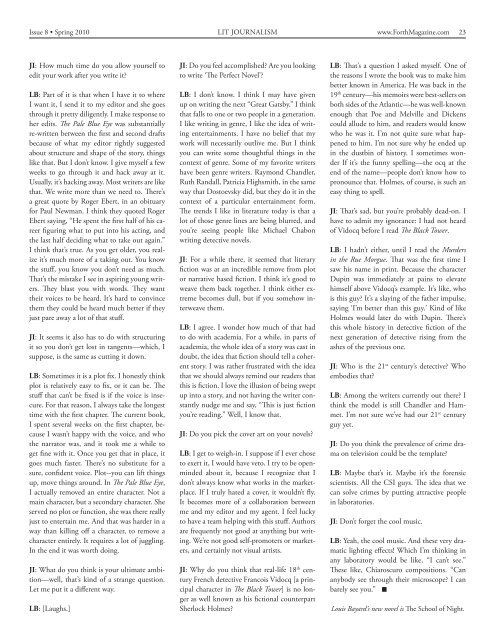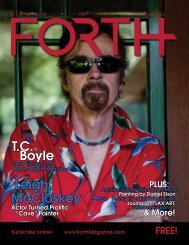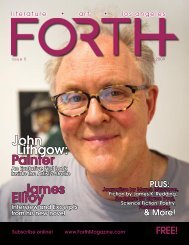Download PDF of Issue #8 - FORTH Magazine
Download PDF of Issue #8 - FORTH Magazine
Download PDF of Issue #8 - FORTH Magazine
You also want an ePaper? Increase the reach of your titles
YUMPU automatically turns print PDFs into web optimized ePapers that Google loves.
<strong>Issue</strong> 8 • Spring 2010 LIT JOURNALISMwww.Forth<strong>Magazine</strong>.com 23JI: How much time do you allow yourself toedit your work after you write it?LB: Part <strong>of</strong> it is that when I have it to whereI want it, I send it to my editor and she goesthrough it pretty diligently. I make response toher edits. The Pale Blue Eye was substantiallyre-written between the first and second draftsbecause <strong>of</strong> what my editor rightly suggestedabout structure and shape <strong>of</strong> the story, thingslike that. But I don’t know. I give myself a fewweeks to go through it and hack away at it.Usually, it’s hacking away. Most writers are likethat. We write more than we need to. There’sa great quote by Roger Ebert, in an obituaryfor Paul Newman. I think they quoted RogerEbert saying, “He spent the first half <strong>of</strong> his careerfiguring what to put into his acting, andthe last half deciding what to take out again.”I think that’s true. As you get older, you realizeit’s much more <strong>of</strong> a taking out. You knowthe stuff, you know you don’t need as much.That’s the mistake I see in aspiring young writers.They blast you with words. They wanttheir voices to be heard. It’s hard to convincethem they could be heard much better if theyjust pare away a lot <strong>of</strong> that stuff.JI: It seems it also has to do with structuringit so you don’t get lost in tangents—which, Isuppose, is the same as cutting it down.LB: Sometimes it is a plot fix. I honestly thinkplot is relatively easy to fix, or it can be. Thestuff that can’t be fixed is if the voice is insecure.For that reason, I always take the longesttime with the first chapter. The current book,I spent several weeks on the first chapter, becauseI wasn’t happy with the voice, and whothe narrator was, and it took me a while toget fine with it. Once you get that in place, itgoes much faster. There’s no substitute for asure, confident voice. Plot--you can lift thingsup, move things around. In The Pale Blue Eye,I actually removed an entire character. Not amain character, but a secondary character. Sheserved no plot or function, she was there reallyjust to entertain me. And that was harder in away than killing <strong>of</strong>f a character, to remove acharacter entirely. It requires a lot <strong>of</strong> juggling.In the end it was worth doing.JI: What do you think is your ultimate ambition—well,that’s kind <strong>of</strong> a strange question.Let me put it a different way.LB: [Laughs.]JI: Do you feel accomplished? Are you lookingto write ‘The Perfect Novel’?LB: I don’t know. I think I may have givenup on writing the next “Great Gatsby.” I thinkthat falls to one or two people in a generation.I like writing in genre, I like the idea <strong>of</strong> writingentertainments. I have no belief that mywork will necessarily outlive me. But I thinkyou can write some thoughtful things in thecontext <strong>of</strong> genre. Some <strong>of</strong> my favorite writershave been genre writers. Raymond Chandler,Ruth Randall, Patricia Highsmith, in the sameway that Dostoevsky did, but they do it in thecontext <strong>of</strong> a particular entertainment form.The trends I like in literature today is that alot <strong>of</strong> those genre lines are being blurred, andyou’re seeing people like Michael Chabonwriting detective novels.JI: For a while there, it seemed that literaryfiction was at an incredible remove from plotor narrative based fiction. I think it’s good toweave them back together. I think either extremebecomes dull, but if you somehow interweavethem.LB: I agree. I wonder how much <strong>of</strong> that hadto do with academia. For a while, in parts <strong>of</strong>academia, the whole idea <strong>of</strong> a story was cast indoubt, the idea that fiction should tell a coherentstory. I was rather frustrated with the ideathat we should always remind our readers thatthis is fiction. I love the illusion <strong>of</strong> being sweptup into a story, and not having the writer constantlynudge me and say, “This is just fictionyou’re reading.” Well, I know that.JI: Do you pick the cover art on your novels?LB: I get to weigh-in. I suppose if I ever choseto exert it, I would have veto. I try to be openmindedabout it, because I recognize that Idon’t always know what works in the marketplace.If I truly hated a cover, it wouldn’t fly.It becomes more <strong>of</strong> a collaboration betweenme and my editor and my agent. I feel luckyto have a team helping with this stuff. Authorsare frequently not good at anything but writing.We’re not good self-promoters or marketers,and certainly not visual artists.JI: Why do you think that real-life 18 th centuryFrench detective Francois Vidocq [a principalcharacter in The Black Tower] is no longeras well known as his fictional counterpartSherlock Holmes?LB: That’s a question I asked myself. One <strong>of</strong>the reasons I wrote the book was to make himbetter known in America. He was back in the19 th century—his memoirs were best-sellers onboth sides <strong>of</strong> the Atlantic—he was well-knownenough that Poe and Melville and Dickenscould allude to him, and readers would knowwho he was it. I’m not quite sure what happenedto him. I’m not sure why he ended upin the dustbin <strong>of</strong> history. I sometimes wonderIf it’s the funny spelling—the ocq at theend <strong>of</strong> the name—people don’t know how topronounce that. Holmes, <strong>of</strong> course, is such aneasy thing to spell.JI: That’s sad, but you’re probably dead-on. Ihave to admit my ignorance: I had not heard<strong>of</strong> Vidocq before I read The Black Tower.LB: I hadn’t either, until I read the Murdersin the Rue Morgue. That was the first time Isaw his name in print. Because the characterDupin was immediately at pains to elevatehimself above Vidocq’s example. It’s like, whois this guy? It’s a slaying <strong>of</strong> the father impulse,saying ‘I’m better than this guy.’ Kind <strong>of</strong> likeHolmes would later do with Dupin. There’sthis whole history in detective fiction <strong>of</strong> thenext generation <strong>of</strong> detective rising from theashes <strong>of</strong> the previous one.JI: Who is the 21 st century’s detective? Whoembodies that?LB: Among the writers currently out there? Ithink the model is still Chandler and Hammet.I’m not sure we’ve had our 21 st centuryguy yet.JI: Do you think the prevalence <strong>of</strong> crime dramaon television could be the template?LB: Maybe that’s it. Maybe it’s the forensicscientists. All the CSI guys. The idea that wecan solve crimes by putting attractive peoplein laboratories.JI: Don’t forget the cool music.LB: Yeah, the cool music. And these very dramaticlighting effects! Which I’m thinking inany laboratory would be like, “I can’t see.”These like, Chiaroscuro compositions. “Cananybody see through their microscope? I canbarely see you.” Louis Bayard’s new novel is The School <strong>of</strong> Night.




